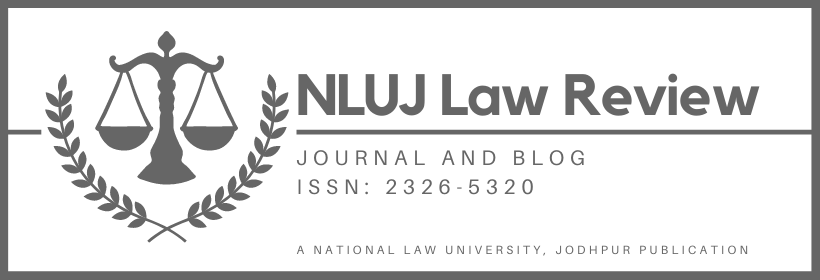The decision of the Kolkata High Court in Ganapati Dealcom v. Union of India, wherein it gave prospective application to the Benami Transactions (Prohibition) Amendment Act, 2016 (hereinafter, “the 2016 Act”), has been challenged before the Supreme Court. Intervention by the Supreme Court (hereinafter, “SC”) is warranted to settle the ambiguity in the nature of the 2016 Act; especially after the contradictory verdicts of the Rajasthan HC in Niharika Jain v. Union of India and the Chhattisgarh HC in Tulsi Ram v. Assistant Commissioner of Income, holding the 2016 Act to be of prospective and retrospective nature, respectively.
What are Benami Transactions?
Benami transactions were first prohibited in India by virtue of Section 2(a) of the Benami Transactions (Prohibition) Act, 1988 (hereinafter, “the 1988 Act”), which defined a benami transaction as a “transaction in which property is transferred to one person for a consideration paid or provided by another person”. The legislative intent behind prohibiting benami transactions was to deter people from entering into such transactions for dishonorable purposes, including but not limited to money laundering, evasion of taxes, and diverting assets in order to fake insolvency and defeat the lawful claims of creditors.
Background
Section 3(3) of the 1988 Act punishes anyone who enters into a benami transaction with imprisonment for a period of 3 years. Section 5 of the 1988 Act provides for acquisition of benami property in accordance with the rules framed under Section 8 of the Act. Further, section 8 authorizes the Central Government to frame rules of procedure regarding the composition of the competent authority and the procedure to be followed for the acquisition of such property. Unfortunately, the rules under Section 8 were framed by virtue of the Benami Prohibition Transaction (Amendment) Act, 2016, after a long period of 28 years. The 2016 Act, besides detailing the rules of procedure, includes a holistic definition clause ‘touching upon’ the substantive aspects of the law related to benami transactions.
In Tulsi Ram v. Assistant Commissioner of Income, the Chhattisgarh HC observed in paragraph 13 of its judgment that the 2016 Act, being an amending enactment, has to be read together with the provisions of the 1988 Act. It held that a conjunctive reading of the Acts of 1988 and 2016 reflects that Section 1 (3) of the 1988 Act gives retrospective effect to the provisions of the 2016 Act. Conversely, it can be argued that retrospective application of the 2016 Act will be hit by Article 20(1) of the Constitution since it creates a ‘new offence’ by widening the definition of “benami transaction”. It can further be argued that the 2016 Act provides for ‘confiscation’ of benami property rather than its ‘acquisition’, which was prescribed by the previous Act, thereby levying a harsher penalty and again being hit by Article 20(1). The state, on the other hand, argued in Ganpati Dealcom that the 2016 Act merely clarifies the substantive aspects of the law and is in nature of a ‘declaratory statute’ and does not create any ‘new’ offence, thereby not being in violation of Article 20(1). Thus, there are primarily three questions before the SC in the instant appeal; first, whether there is legislative intent to give retrospective effect to the 2016 Act; second, whether the 2016 Act imposes a harsher penalty than the earlier Act in so far as it provides for ‘confiscation’ of benami property rather than its ‘acquisition’, thereby violating Article 20(1); and third, whether the 2016 Act creates a ‘new offence’ by widening the definition of “benami transactions”.
It will not be the first time that the apex court will adjudicate upon the retrospective nature of the 2016 Act. In 2019, the SC in paragraph 12 of its judgment in Mangathai Ammal v. Rajeswari relied upon its judgment in Binapani Paul v. Pratima Ghosh to give prospective application to the 2016 Act. Interestingly, Binapani Paul, a 2007 judgment which never scrutinized the merits of the 2016 legislation and is thus wholly irrelevant for determining the retrospective nature of the 2016 Act, has been relied upon by the SC as an authority to justify the prospective nature of the 2016 Act. Effectively, a judgment which was delivered at a time when the legislation was not even in existence has been cited by the court as an authority on that particular legislation. Similarly, the judgment of the Bombay HC in Joseph Ishrat v. Rozy Gaikwad is fallacious since it relies upon a 1996 judgment of the SC, namely, R. Rajgopal Reddy v. Padmini Chandrasekhran to justify prospective nature of the 2016 Act. Notably, the Delhi HC in Anir Ur Rehman v. Mohd Tahir explicitly rejected the reasoning of the Bombay HC in Joseph Ishrat thereby giving retrospective effect to the 2016 Act. It therefore becomes pertinent for the SC to holistically revisit the existing jurisprudence on the issue in its enquiry in Ganpati Dealcom.
The Question of Legislative Intent
The maxim ‘lex prospicit non respicit’ which means that ‘the law looks forward and not backward’ lies at the core of the presumption against retrospective application of statutes. In Commissioner of Income Tax v. Vatika Township Private Limited, the SC held that a statute can be given retrospective effect only when there is express legislative intent in that regard. However, express legislative intent could be used to give retrospective application to only procedural and civil laws; imposing criminal liabilities retrospectively would be hit by Article 20(1) of the Constitution. However, declaratory or explanatory statutes can be applied retrospectively, since they only clarify or expressly enumerate the scope of an already laid offence and do not create any ‘new offence’.
Section 1(3) of the unamended 1988 Act states, “The provisions of sections 3, 5 and 8 shall come into force at once (September 5, 1988), and the remaining provisions of this Act shall be deemed to have come into force on the May 19, 1988.” This provision was retained as is by the 2016 Act. The Kolkata HC in paragraph 27 of its judgment in Ganpati Dealcom observed that the 2016 Act, being a ‘new legislation’, could not be given retrospective effect ‘automatically’ in absence of an express provision which in turn expressly specifies that the 2016 Act was intended to have a retrospective effect. This reasoning of the HC merits a closer analysis.
It should be noted here that Chapter VII of the 2016 Act was given prospective effect by virtue of an express clause to that effect in Section 3(3) of the 2016 Act. However, the legislature retained Section 1(3) of the 1988 Act as is in the 2016 Act, thus reflecting its intention to apply the 2016 Act retrospectively. Had it intended to give prospective effect to the entire 2016 Act, it would have taken a similar recourse as taken in Section 3(3) and enacted a suitable provision to give such prospective effect. The Chhattisgarh HC in paragraph 16 of its judgment in Tulsi Ram v. Assistant Commissioner of Income has followed the same reasoning and held that the 2016 Act is retrospective in nature. There is clear and cogent evidence reflecting that the legislature intended to give retrospective application to the 2016 Act. Late Shri Arun Jaitley while moving the 2016 Act before the Rajya Sabha, unequivocally stated that the 2016 Act would apply retrospectively. Further, the 28th Report of Standing Committee on Finance, Ministry of Finance (Department of Revenue) on The Benami Transactions (Amendment) Bill, 2015 quotes the Law Ministry while clarifying that the amendment was brought so that “the offences committed during the last twenty six years are also covered”.
Will the Penalty of Confiscation be Hit by Article 20 (1)?
Another argument against retrospectivity has been that the Acts of 1988 and 2016 provide for ‘acquisition’ and ‘confiscation’ of the benami property respectively; therefore, the scheme of attachment of benami property under the 2016 Act is harsher than the 1988 Act thereby violating Article 20(1) of the Constitution. However, another question emanates from the argument. Does confiscation of property amount to a ‘penalty’ as contemplated under Article 20(1) of the Constitution? The question was answered in the negative by the Patna HC in Yogendra Kumar Jaiswal v. State of Bihar. In that case, the court noted that the term ‘penalty’ under Article 20(1) of the Constitution was “analogous to the word ‘punishment’ prescribed for an offence which shall cover punishment of imprisonment as well as fine prescribed for any offence”. The court giving its reasons behind holding confiscation to be a civil liability observed in paragraph 29, “confiscation of property procured by means of the offence by a public servant cannot amount to any legal loss to the accused and hence confiscation under the provisions of the Act does not amount to any penalty or punishment”. An application of the law laid down by the Patna HC in the present case will lead to the sole conclusion that ‘confiscation’ of benami property is outside the scope of Article 20(1) of the Constitution.
Retrospective application will not be hit by Article 20(1) even if the above argument is rejected and confiscation is not treated as a civil liability. This is primarily because of the declaratory nature of the 2016 Act. The meaning attributed to the term ‘confiscation’ under Section 27(3) of the 2016 Act is not different from the meaning of ‘acquisition’ under the 1988 Act. Section 27 (3) of the 2016 Act states, “rights and title of a confiscated property shall vest absolutely in the Central Government free of all encumbrances.” The term ‘acquisition’ is not defined under the 1988 Act. Black’s Law Dictionary defines it as “The act of becoming the owner of certain property; the act by which one acquires or procures the property in anything.” A close analysis of the aforementioned definitions reflects that ‘confiscation’ and ‘acquisition’ carry the same meaning. Thus, the argument, that the 2016 Act imposes a harsher penalty by substituting ‘acquisition’ by ‘confiscation’ and is thereby, violative of Article 20(1) of the Constitution, holds no water.
Does the Act Of 2016 Widen the Definition of Benami Transactions, Thereby, Creating A ‘New Offence’?
Section 2(a) of the 1988 Act defines a benami transaction as “any transaction in which property is transferred to one person for a consideration paid or provided by another person.” The 2016 Act defines it as “a transaction where a property is transferred to, or is held by, a person, and the consideration for such property has been provided, or paid by, another person.” The argument advanced against retrospectivity is that while the 1988 Act merely punished transfer of ‘title’ of the property; the 2016 Act took in its ambit, both the transfer of ‘title’ as well as ‘possession’ of benami property; thus, creating a ‘new offence’ of ‘holding’ benami property, thereby, violating Article 20(1). The argument advanced is flawed since it assumes that the term ‘transfer’ in Section 2(a) of the 1988 Act only contemplates transfer of ‘title’ and not of ‘possession’.
Section 2(a) of the 1988 Act should be given a wider meaning to penalize the benamidar, the beneficial owner and any other person who acts with the requisite mens rea in assisting the beneficial owner in bypassing the law. A restrictive interpretation of the term will be against the objectives of the Act and the same will grant immunity to an accomplice who held the property (without being the titular owner of the property) and actively assisted the beneficial owner in circumventing the law. If the title to a property is transferred in a fictitious name and the possession for such property rests with a person, who intentionally holds this property for the direct or indirect benefit of the beneficial owner thereby acting as an accomplice, then that person should also be held liable under the 1988 Act. Therefore, the 2016 Act did not create any ‘new offence’; it only clarified the scope of the 1988 Act.
Period of Limitation
The Kolkata HC in Ganpati Dealcom observed in paragraph 39 of its judgment that benami transactions entered into in 2011 would enjoy immunity from criminal proceedings due to expiry of the period of limitation. The court was indicating that even if the 2016 Act is given retrospective application and is deemed to have come into effect in 1988 itself, no criminal proceedings could be initiated against individuals who entered into benami transactions in light of the bar of limitation provided by Section 468 of the Cr.P.C. (three years in this case); thus reflecting that an interpretation favoring retrospective application would not serve any meaningful purpose. However, this argument cannot act as an absolute impediment in giving retrospective effect to the 2016 Act. In light of the huge public interest involved, the court should not shy away from exercising its discretion under Section 473 of the Cr.P.C. (which has an overriding effect over Section 468 of the code) which gives it flexibility to extend the period of limitation “in the interests of justice”.
Conclusion
The judgment of the Kolkata HC Ganapati Dealcom v. Union of India is erroneous in light of the various principles encapsulating the retrospective application of statutes and the Article 20 (1) of the Constitution. The impugned judgment merits closer analysis by the Supreme Court to bring out the correct interpretation of law.
This article has been written by Mukund Sinha, student at Hidayatullah National Law University, Raipur.



